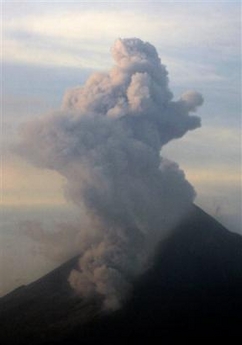Mount Merapi shot a large cloud of searing hot ash and gas into the sky
Wednesday, ending two days of relative calm and underscoring the dangers still
facing thousands of people living on the volcano's slopes.

Indonesia's Merapi volcano erupts in
Cangkringan Wednesday, May 17, 2006 as seen from Yogyakarta, the capital
of Central Java province, Indonesia. The highest-status alert remained
Wednesday for the 3,000-meter (9,800-foot) mountain at the heart of Java
island, and scientists cautioned that a lull in activity did not mean the
danger was over. [AP] |
Witnesses said the eruption appeared to be smaller than the mountain's most
violent sputterings Monday, when ash and gas clouds surged around 2 1/2 miles
from the peak and triggered panic.
Vulcanologists keeping the mountain on 24-hour watch were not immediately
available for comment on the eruption just after 5 p.m. (6 a.m. EDT), which sent
debris plunging down its western flanks, but appeared to fell well short of
populated areas.
Earlier Wednesday, farmers journeyed high up Merapi's slopes collecting grass
for cows and children kicked soccer balls ¡ª both within a 3.7-mile zone declared
off-limits when the mountain was placed on its highest alert Saturday.
"There is nothing to worry about here," said Warkijho, a 55-year-old farmer
who like many in his village deep within the government-ordered evacuation zone
has refused to leave. "The scientists may be concerned, but in my heart I know
it is safe."
Despite the calm over the last 48 hours, experts had said that Merapi
remained dangerous. The mountain has kept spitting out red-hot rocks and lava
flows that light the night sky.
A 3 million-cubic-yard lava dome that has built up over the mountain's
slow-burn eruption in recent weeks was still perched on the crater and could
collapse, triggering a deadly surge in ash and gas, scientists have warned.
President Susilo Bambang Yudhoyono on Wednesday met with some of the more
than 5,000 people who have fled the volcano and are staying in temporary housing
such as converted schools. Yudhoyono and his wife stayed Tuesday night in a tent
among the refugees.
Yudhoyono urged those still refusing to leave the evacuation zone to move to
safety.
Most of those refusing to go were farmers, and have crops to tend or animals
to feed.
Mount Merapi, which translates as "Fire Mountain," has erupted scores of
times over the last 200 years, often with deadly results. It is one of the
world's most active volcanoes.
In 1994, 60 people were killed by a searing gas cloud while in 1930, more
than a dozen villages were incinerated, leaving 1,300 dead.
The volcano plays a central role in the belief system of villagers living on
its fertile land. Many of them believe spirits watching over the volcano will
warn them of danger.
An 80-year-old man entrusted by the nearby royal court to be the spiritual
guardian of the volcano has been criticized because he has refused to evacuate,
along with many people living in villages within a few miles of the crater.
But instead of going down the mountain, mystic Maridjan, hiked up it Tuesday
morning to mediate and has not yet returned, his daughter and other villagers
said Wednesday.
"I know what Dad is like," said the daughter, Sulami. "He needs to do this,
and God willing, things will now be calm."